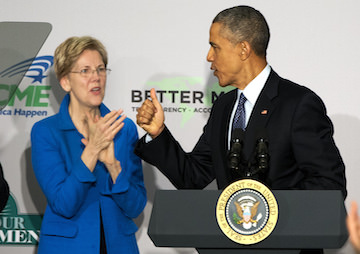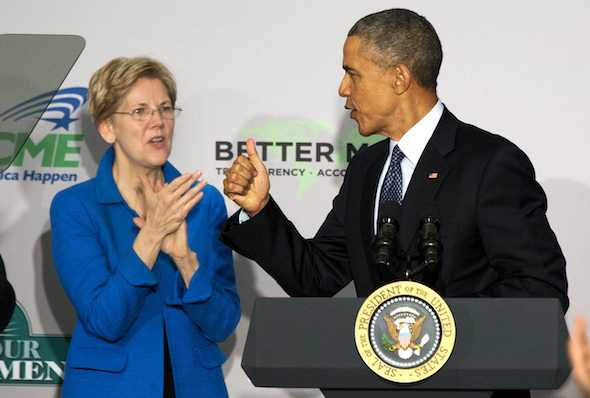Sen. Warren’s Critique of the Trans-Pacific Partnership Puts Prickly Obama on Defense
The senator's unyielding criticism of the proposed trade treaty has driven the president into uncharacteristic contortions as he defends what he alleges to be “the most progressive trade deal in history” -- a deal that contains certain elements he won’t allow the public to see.

Sen. Elizabeth Warren, D-Mass., and President Barack Obama earlier this year. (AP / Jacquelyn Martin)
Sen. Elizabeth Warren’s unyielding criticism of the proposed Trans-Pacific Partnership (TPP) trade treaty has driven President Obama into uncharacteristic contortions as he defends what he alleges to be “the most progressive trade deal in history” — a deal that contains certain elements he won’t allow the public to see.
Some members of Congress are remarkably limited in their ability to access and interpret the bill. Sen. Sherrod Brown, D-Ohio, who acknowledged that he has yet to read every page of the deal, told NPR: “I bet that none of my colleagues have read the entire document. I would bet that most of them haven’t even spent a couple hours looking at it.”
NPR explains:
[E]ven if a member of Congress were to hunker down and pore over a draft trade agreement hundreds of pages long, filled with technical jargon and confusing cross-references –- what good would it do? Just sitting down and reading the agreement isn’t going to make its content sink in.
For any senator who wants to study the draft TPP language, it has been made available in the basement of the Capitol, inside a secured, soundproof room. There, lawmakers surrender their cellphones and other mobile devices and sit under the watchful gaze of an official from the U.S. Trade Representative’s office while they peruse the pages. Any notes taken inside the room must be left in the room.
Only aides with high-level security clearances can accompany lawmakers. Members of Congress can’t ask outside industry experts or lawyers to analyze the language. They can’t talk to the public about what they read. And Brown says there’s no computer inside the secret room to look something up when there’s confusion. You just consult the USTR official.
Brown added, “There is more access in most cases to CIA and Defense Department and Iran sanctions documents—better access to congressional staff and others—than for this trade agreement.”
Warren’s criticisms of the deal center on a part known as Investor-State Dispute Settlement (ISDS). She and many other critics have said this clause would allow corporations to sue governments—including the U.S. government—whose regulatory laws threaten to limit corporations’ profits.
An exchange about ISDS between Warren and The Washington Post’s The Plum Line on Monday went like this:
WARREN: I’ve sat with many legal scholars to talk about this issue, and I have not seen a draft that would do what the president says he has already accomplished….Hillary Clinton in her book raised concerns about precisely this issue. Just last week, some of the top legal and economic minds in this country, including the president’s mentor from Harvard, Laurence Tribe, and Nobel-prize-winning economist Joe Stiglitz, raised exactly this concern.
PLUM LINE: Is it theoretically possible to write ISDS in a way that precludes it from overriding regulation?
WARREN: It doesn’t directly tell countries to repeal regulations. It imposes a financial penalty, which has caused countries to change their regulations…[ISDS mechanisms] never had the authority to override regulations. What they had was the authority to impose a monetary penalty directly against the government and its taxpayers. That’s the point at which governments have backed up and said, “we can’t afford this, we’ll just change the law.”
PLUM LINE: You can’t envision even in theory a way to structure ISDS that would assuage your concerns?
WARREN: Once a group of independent arbiters, whose decisions cannot be appealed, can issue a money judgment of any size, then the ISDS problem arises….Here’s what you could do. If corporations had to go through the same procedures that anyone else has to go through to get the trade deal enforced, then the problem wouldn’t exist.
Now, if a labor union says, ‘Vietnam promised not to work people for a couple of dollars a day, and to raise working conditions, and then failed to do it,” they have to get the U.S. government, through the trade rules, to go to Vietnam and prosecute the case. If corporations had to do the same thing, then it would be a level playing field…ISDS gives a special break to giant corporations, a break that nobody else gets.
The Plum Line also asked Warren how financial interests could use ISDS to weaken regulations on big banks:
PLUM LINE: What you’re arguing is that six years of fast track, plus ISDS, could ultimately result in the weakening of financial regulations? You’re not saying ISDS itself would do that?
WARREN: Absolutely right…six years means that whatever the Obama administration has committed to won’t bind the next president. If that president wants to negotiate a trade deal that undercuts Dodd Frank, it will be very hard to stop it.
PLUM LINE: Couldn’t a Republican president simply go straight at Dodd Frank? Would this be any easier than that?
WARREN: Absolutely. Because trade will be fast tracked for six years….A direct run at Dodd Frank potentially takes 60 votes in the U.S. Senate. But doing it through trade authority needs to be done with 51 votes.
PLUM LINE: But wouldn’t that require a direct change to U.S. legislation?
WARREN: It’s possible to punch holes in Dodd Frank without directly repealing it. For example, harmonization of the capital standards and leverage ratios could be adjusted to help the big banks without ever directly contradicting Dodd Frank. But the effects of Dodd Frank would be severely undercut.
Obama’s responses to this and other criticisms were summarized by Talking Points Memo:
Obama has repeatedly shot back that Warren’s criticisms are “ad hominem attacks and misinformation that stirs up the base but ultimately doesn’t serve them well.”
A week ago Obama once again jabbed at Warren saying she is “absolutely wrong” to say the deal could potentially allow participating countries to get around Dodd-Frank regulations.
“Think about the logic of that, right?” Obama told Yahoo News. “The notion that I had this massive fight with Wall Street to make sure that we don’t repeat what happened in 2007, 2008. And then I sign a provision that would unravel it? I’d have to be pretty stupid.”
Obama has also shrugged of[f] Warren’s claims that the ISDS procedures would weaken financial regulation laws as “bunk.”
Going back to late April, Warren challenged Obama and his administration over his secretiveness with the TPP in a blog titled “You can’t read this”:
The Administration says I’m wrong – that there’s nothing to worry about. They say the deal is nearly done, and they are making a lot of promises about how the deal will affect workers, the environment, and human rights. Promises – but people like you can’t see the actual deal.
For more than two years now, giant corporations have had an enormous amount of access to see the parts of the deal that might affect them and to give their views as negotiations progressed. But the doors stayed locked for the regular people whose jobs are on the line.
If most of the trade deal is good for the American economy, but there’s a provision hidden in the fine print that could help multinational corporations ship American jobs overseas or allow for watering down of environmental or labor rules, fast track would mean that Congress couldn’t write an amendment to fix it. It’s all or nothing. …
We’ve all seen the tricks and traps that corporations hide in the fine print of contracts. We’ve all seen the provisions they slip into legislation to rig the game in their favor. Now just imagine what they have done working behind closed doors with TPP.
— Posted by Alexander Reed Kelly.
Independent journalism is under threat and overshadowed by heavily funded mainstream media.
You can help level the playing field. Become a member.
Your tax-deductible contribution keeps us digging beneath the headlines to give you thought-provoking, investigative reporting and analysis that unearths what's really happening- without compromise.
Give today to support our courageous, independent journalists.









You need to be a supporter to comment.
There are currently no responses to this article.
Be the first to respond.